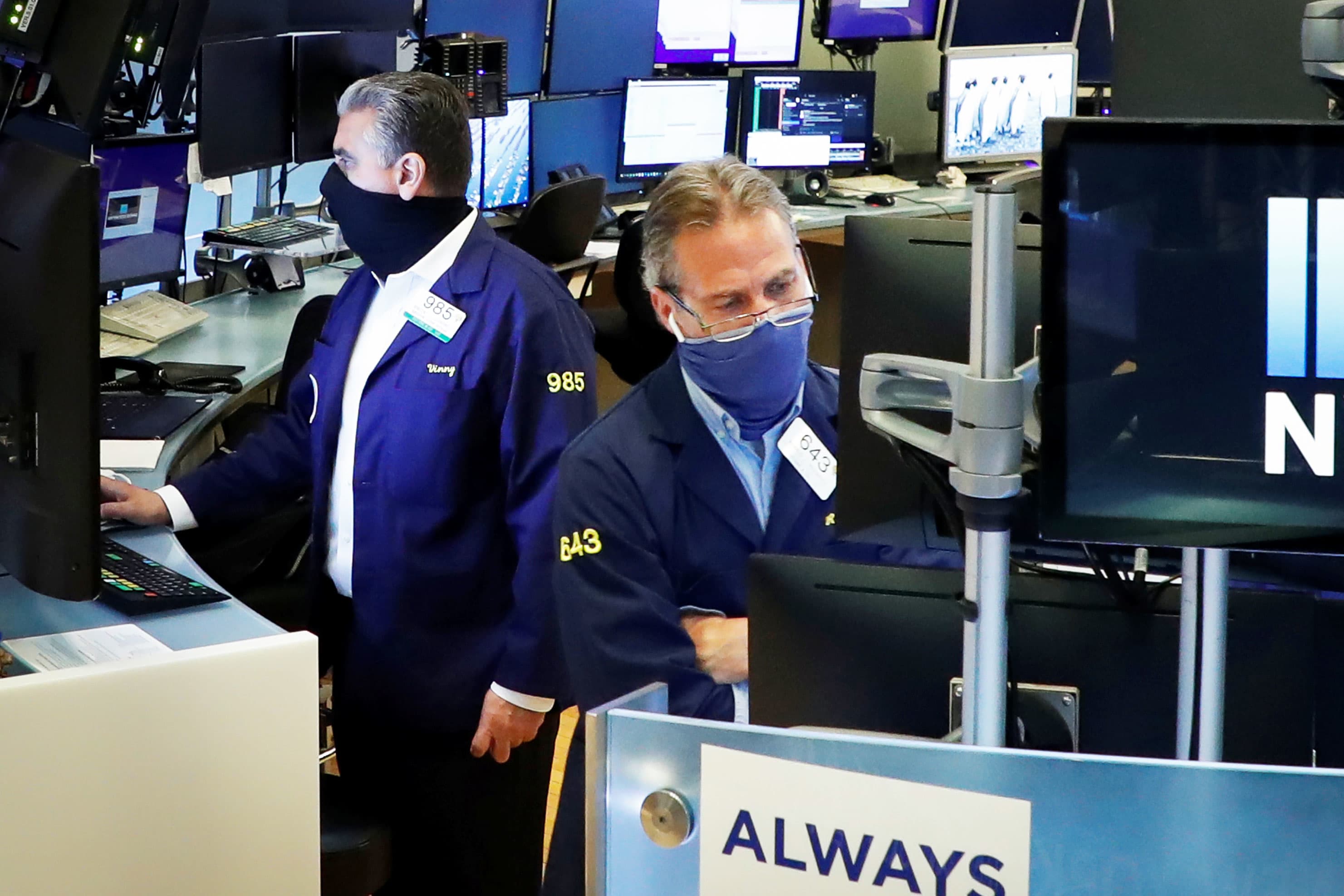U.S. stock futures rebound from Tuesday’s decline as Trump urges airline aid

Futures rebounded Wednesday from Tuesday’s slide after President Donald Trump tweeted support for aid to airlines and other stimulus measures.
It was unclear whether this meant Trump was walking back his halt of stimulus talks with Democrats, a move which knocked the Dow Jones Industrial average down by more than 300 points on Tuesday.
Dow futures gained 145 points, or 0.5%. This implied an opening gain of nearly 200 points. S&P 500 futures added 0.4% and Nasdaq 100 futures rose 0.35%.
President Trump urged Congress to approve airline payroll support, saying that money and aid for small business could be paid for with unused funds from the previous stimulus. Shares of United Airlines gained more than 3% in premarket trading, making back nearly all of their Tuesday decline. Delta gained 2%.
Trump also urged Congress in a tweet to approve $1,200 stimulus checks for Americans.
In regular trading on Tuesday, the Dow Jones Industrial Average closed down 375 points after Trump tweeted the White House is halting talks with Democrats about a second coronavirus stimulus deal. Earlier in the session, stocks rallied in hopes that there would be a second relief package to prop up markets as the coronavirus outbreak continues.
“I have instructed my representatives to stop negotiating until after the election when, immediately after I win, we will pass a major Stimulus Bill that focuses on hardworking Americans and Small Business,” Trump said in a tweet on Tuesday.
The S&P 500 lost 1.4% and the Nasdaq Composite fell 1.57% on Tuesday.
Some on Wall Street speculated Trump’s move was a mere negotiating tactic, while others hypothesized the president truly doesn’t think the economy needs another $2 trillion in fiscal spending.
Bridgewater Associates’ Ray Dalio told CNBC’s “Street Signs Asia” on Wednesday morning Singapore time that the U.S. president’s move is “certainly not a good thing” and will be a “significant negative” on the economy.
“That’s … a lot of money, whatever it would’ve been,” Dalio said, adding that there’ll be “a lot of stress” for those who are not going to get the funds.
Meanwhile, Pershing Square Capital Management’s Bill Ackman said in a tweet directed at Trump and House Speaker Nancy Pelosi: “Mr. President and Madam Speaker, in that you both agree on the first $1.6T of stimulus, why not immediately fund $1.6T of stimulus and leave the disputed $400B to the outcome of the election? That way, Americans in need can be helped now.”
Federal Reserve Chairman Jerome Powell said Tuesday the economy needs more aggressive fiscal and monetary stimulus for an economic recovery that he said still has “a long way to go.”
Powell said the lack of support could “lead to a weak recovery, creating unnecessary hardship for households and businesses” and thwart a rebound that thus far has progressed more quickly than expected. “By contrast, the risks of overdoing it seem, for now, to be smaller,” Powell added.
“Chairman Powell has said that we need more stimulus, and this is going against the advice of the chairman of the Federal Reserve and the markets don’t really like going against the advice of the chairman of the Federal Reserve,” said Tom Block, Washington policy strategist for Fundstrat. “I would not say it’s over for good but I would say it’s a very negative sign and likely pushes it until after the election.”
Cleveland Fed President Loretta Mester said later on Tuesday that the end of stimulus talks means the economic recovery will be “much slower” than originally expected.
The Federal Open Market Committee will publish its meeting minutes from its September meeting at 2 p.m. ET on Wednesday. The FOMC made no action on interest rates in September, leaving them near zero.
Subscribe to CNBC PRO for exclusive insights and analysis, and live business day programming from around the world.
—CNBC’s Pippa Stevens contributed to this report.




